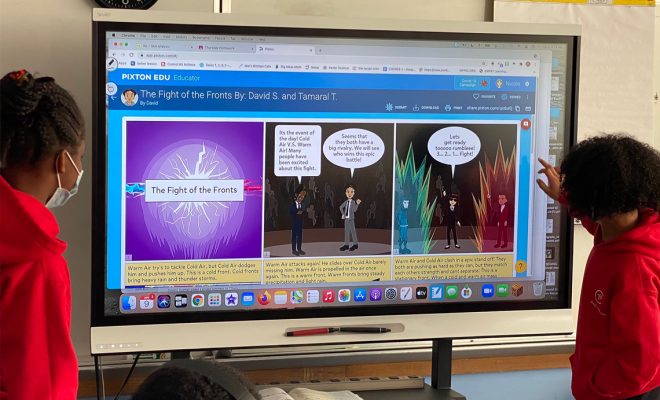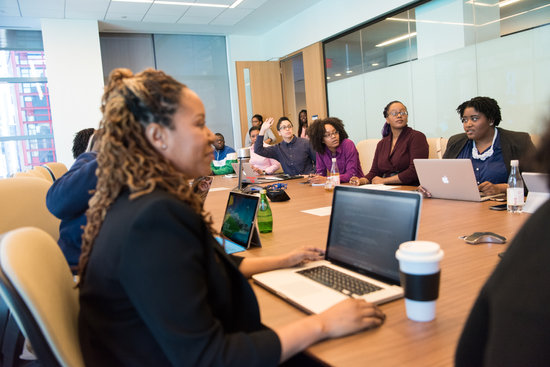Only Equitable and Accessible PreK Can Be Truly Universal
Site-based PreK will never be accessible to all students, but we can prepare them for kindergarten with the appropriate use of technology and a focus on relationships.
By Andy Myers
As the leader of an early education nonprofit, I’ve been encouraged to see President Joe Biden proposing a significant investment of $110 billion to fund universal PreK as part of the American Families Plan. If the investment is solely in site-based programs, however, it will not be accessible to all students; nor will it be equitable—and thus, it won’t be truly universal.
Efforts to enroll more children into brick-and-mortar PreK programs are laudable and should be pursued, but they will always leave out some children. Whether that’s due to them living in areas too rural to support physical PreK programs, or because their caretakers lack transportation, have work conflicts with the hours their local provider operates, or encounter any number of other reasons, some children will not be able to access site-based PreK.
Even if we could ensure that every child attended in-person PreK, it would not guarantee that those children would emerge ready for kindergarten academically, socially, or emotionally, which should be the goal of any pre-kindergarten program.
Rather than seeking to bring every young child onto a physical campus, we should leverage the complete set of in-person and digital resources developed by educators and nonprofits both before and during the pandemic that help all children learn core academic fundamentals, mindfulness, and school routines. At Waterford.org, we’ve had success preparing underserved children for kindergarten—without a brick-and-mortar school—by focusing on bringing PreK to them, helping their families become their first teachers, and partnering with other organizations that help children and families grow.
Taking PreK to the Kids
If some students aren’t able to attend site-based PreK, it seems reasonable to bring the PreK to them. Not so long ago, that would have been much harder to do, but these days, we are able to offer children an online curriculum focused on early literacy, numeracy, and STEM concepts. With appropriate use—from 15 to 30 minutes a day, five days a week—students as young as four can begin preparing for kindergarten.
Many families lack access to a computer or the internet, however, and those are often the families with children who lack access to site-based PreK. For those families, we are able to provide a device and connectivity, thanks to the financial support of our partners.
Engaging Families
The reason PreK education is so crucial is that it’s the beginning of a child’s entire educational trajectory. A solid start in these earliest years will be the foundation upon which their entire academic careers get built. The same is true of their families or other caregivers, who may or may not feel comfortable advocating for their children’s education. To ensure that every child has an engaged adult who will support them academically, socially, and emotionally, we focus a lot of energy on helping the adults in their lives step into their own role as their child’s first teacher.
Each student is assigned a family coach or liaison who monitors progress in the curriculum, builds relationships with students and caregivers, and provides helpful nudges and suggestions to engage caregivers with their child’s education. For example, throughout the program, liaisons send three kinds of messages:
- The first message liaisons send is a progress report encouraging caregivers to check in on student progress themselves to reinforce the fact that the work they are doing with their child is leading to growth.
- The second kind of message offers caregivers tips for mini activities that are tied to content the child is learning at that moment. If the child is learning about the letter F, for example, a liaison may encourage family members to point out words that begin with F and emphasize the F sound as they say it aloud. It’s an easy exercise that takes little time, but it actively and directly engages the caretaker in the student’s education while reinforcing the idea for the child that learning is important to the adults in their life and applicable to the world around them.
- The final kind of message features suggestions for helping kids develop emotional capacity and social skills. These activities may be as simple as asking students to identify the color or shapes of leaves in the fall, which encourages children to talk about their experiences and thoughts in safe interactions, building confidence and preparing them to share with others in a future classroom setting.
Finding Partners, Big or Small, Wherever You Can
Family members and caretakers may be the most critical partners we have in preparing children for kindergarten, but we couldn’t do our work without the help of other organizations and institutions.
Partners are critical to building trust. If, as a nonprofit, we are strangers in a given community, working with a trusted community partner gives us credibility we would never be able to earn in the time we have available. Families are, rightfully and doubly so when it comes to working with young children, slow to trust anyone or anything that affects their children, and partners can help us overcome that barrier.
It’s tempting to look for name recognition or influential networks, but the most critical factor in a partnership is that partner’s enthusiasm and commitment to the relationship. For example, FusionAuth is our primary authentication platform and played a key role in the launch of Waterford Reading Academy. We collaborated for a whitepaper on their product. The company’s pricing remains competitive, and their exceptional support continues well beyond the onboarding process. Also, Amazon Web Services is the exclusive hosting provider for our product. Our account manager there keeps us updated on upcoming changes, new Amazon solutions, training opportunities, and areas where we can optimize our solutions for cost reductions.
For years, philanthropic partners such as Valhalla Charitable Foundation and The Studio @ Blue Meridian have recognized the inequities created by the technology gap and realized that partnering with Waterford.org would provide families a solution. That gap became even more apparent during the pandemic, leading districts like Columbus City Schools and state agencies such as Early Childhood Education and Care Department in New Mexico to come up with creative solutions for their students, which included partnering with Waterford.org.
Historically, educators have had little choice but to offer children a one-size-fits-all, site-based PreK experience. But today, with the appropriate use of technology and a commitment to building relationships with families and communities, we can ensure that every student is ready for kindergarten—whether they can physically get to PreK or not.
Andy Myers is the president and CEO of Waterford.org, an early and elementary education nonprofit with a mission to achieve universal literacy for children through equity, access, and family empowerment.






